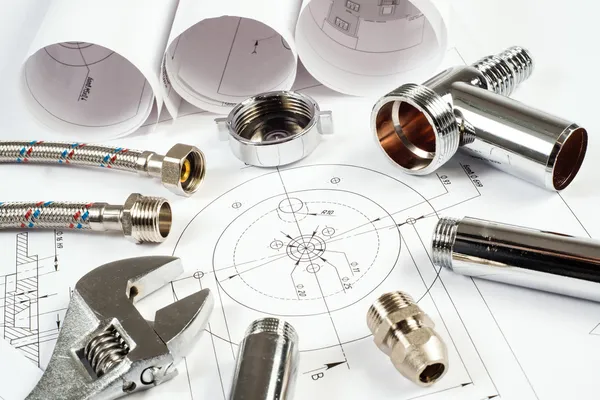Selecting the right pipe for water lines in your home can make a massive difference in durability and water quality. With various types of plumbing pipes available, understanding which materials and types suit different needs can help you avoid costly repairs and ensure a well-functioning plumbing system.
Today we will talk about different kinds of plumbing pipes and provide tips for choosing the best type of plumbing pipes for your home.
Types of Water Line Pipes
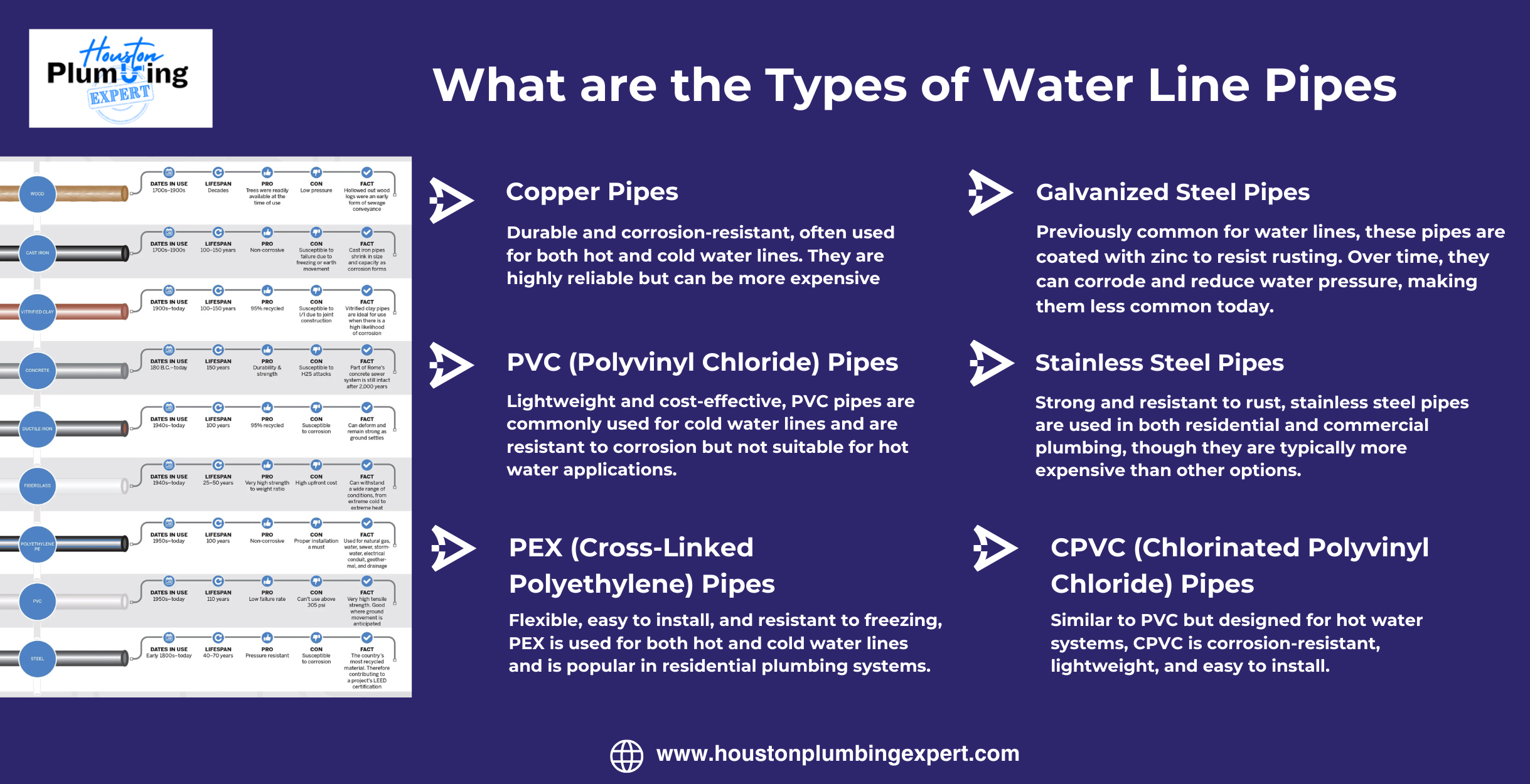
When selecting types of water lines for your home, it is important to know that each material has unique characteristics, advantages, and limitations. Here, we will explore the most common types of waterline pipes and their suitability for various home plumbing needs.
1. Copper Pipes
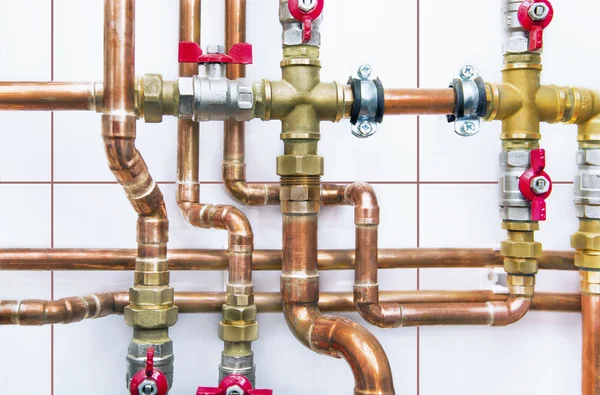
Copper pipes are often considered the best pipe for plumbing due to their durability and ability to withstand high temperatures. They are a traditional choice for water supply line types and are known for their resistance to corrosion and bacterial growth.
- Pros: Copper pipes are durable, long-lasting, and suitable for hot and cold water lines.
- Cons: Installation can be more challenging due to the need for soldering and higher costs.
- Applications: Ideal for indoor and outdoor water supply lines for house, including drinking water.
2. PEX (Cross-Linked Polyethylene) Pipes
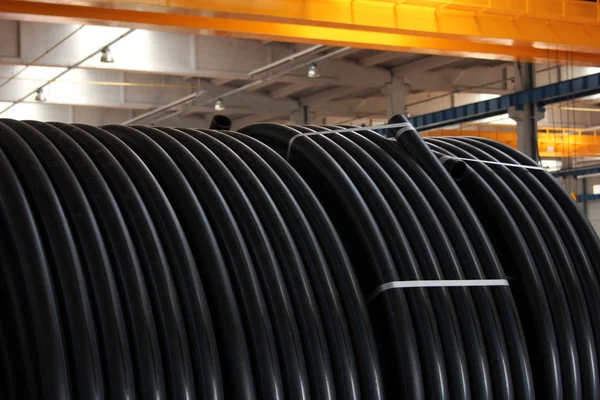
PEX pipes are a newer option that has gained popularity for their flexibility and ease of installation. PEX is often used for plastic water lines in house systems, and it can be bent around obstacles, making it versatile in tight spaces.
- Pros: Flexible, easy to install, resistant to scale and chlorine.
- Cons: Not suitable for outdoor use due to UV sensitivity.
- Applications: Commonly used in hot and cold water lines, especially where flexibility is needed.
If you’re facing leaks in flexible water lines, check our guide on Pipe Repair Services in Houston for professional repair solutions.
3. PVC (Polyvinyl Chloride) Pipes
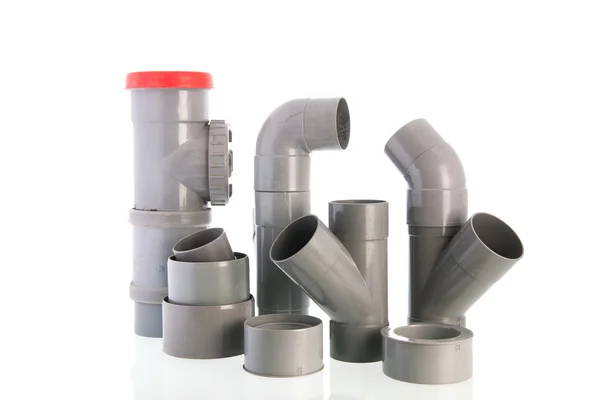
PVC is a plastic pipe for water supply and is widely used due to its affordability, lightweight nature, and corrosion resistance. It is commonly found in water pipes for house setups for low-pressure applications.
- Pros: Lightweight, resistant to rust and corrosion, and easy to install.
- Cons: Not suitable for hot water applications.
- Applications: Used mainly for drain, waste, and vent pipes but also effective in cold-water supply systems.
4. CPVC (Chlorinated Polyvinyl Chloride) Pipes
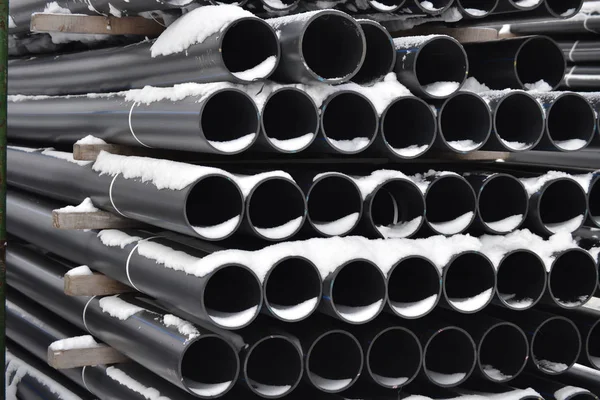
An improvement over traditional PVC, CPVC pipes can handle higher temperatures, making them a good choice for hot water lines. They are also durable, cost-effective, and can be used indoors.
- Pros: Affordable, resistant to high temperatures, easy to install.
- Cons: Can crack in extreme cold and is unsuitable for outdoor use.
- Applications: Used for hot and cold water lines in household plumbing.
5. Galvanized Steel Pipes
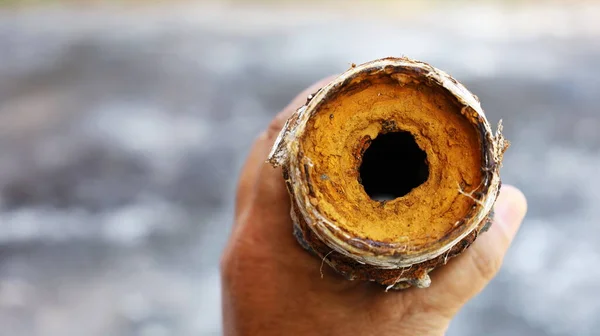
Once a common choice, other materials have largely replaced galvanized steel pipes due to their tendency to rust over time. However, they are still incredibly durable and resistant to wear.
- Pros: Durable and resistant to mechanical damage.
- Cons: Prone to rust and corrosion, affecting water quality.
- Applications: Found in older homes, often used for outdoor water lines.
6. ABS (Acrylonitrile Butadiene Styrene) Pipes
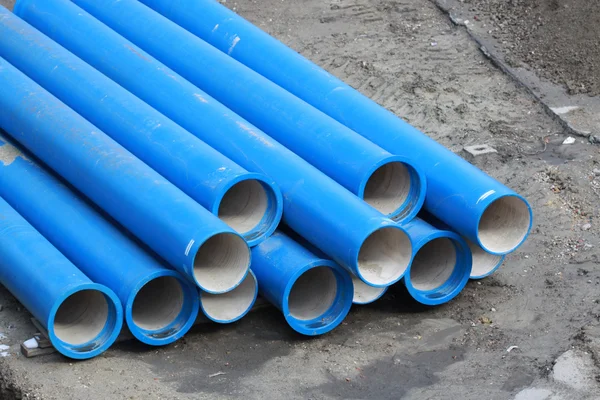
Black ABS pipes are another type of plastic plumbing pipe used primarily for vent and drain systems in homes. They are lightweight and easy to install, though they are less durable in colder climates.
- Pros: Lightweight, easy to work with, and resistant to impact.
- Cons: Limited suitability for cold climates and high temperatures.
- Applications: Used in drain, waste, and vent pipes.
7. Polybutylene Pipes
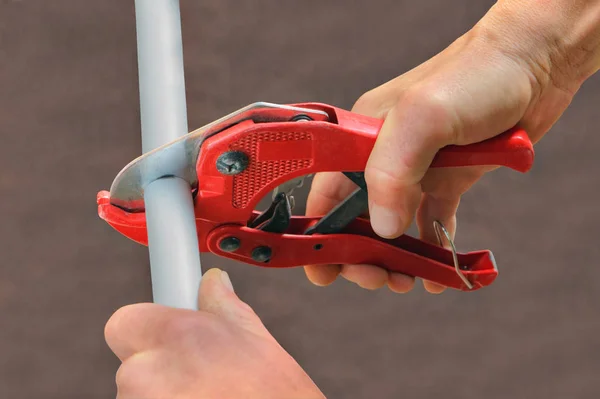
Polybutylene pipes, recognizable by their grey color, were once famous for plastic water piping types but are now largely phased out due to their tendency to crack and fail over time.
- Pros: Initially low-cost and easy to install.
- Cons: Prone to cracking and breaking.
- Applications: These are found in some older homes, though replacement is often recommended.
If your home has damaged or outdated pipes, see How to Repair a Broken Septic Pipe for step-by-step repair insights.
Things to Consider When Selecting Pipe
Choosing the right pipe for water supply in-home systems depends on various factors beyond the pipe material itself. Here is what you need to consider to find the best pipe for plumbing for your home.
1. Durability and Lifespan
The lifespan of different types of piping materials varies greatly. Copper and PEX pipes are known for longevity, with copper often lasting up to 70 years. If you are seeking best pipes for plumbing that will stand the test of time, opt for copper or CPVC.
2. Temperature Resistance
If you are looking for pipes that can handle hot and cold water, choose a material designed for higher temperatures. For example, CPVC and PEX are suitable for hot water, whereas PVC is limited to cold water.
3. Budget
Your budget will affect which types of plastic pipes or metal pipes are affordable. PVC and PEX pipes are more cost-effective, whereas copper and galvanized steel are more expensive.
4. Installation Ease
Plastic plumbing pipe types like PVC and PEX are usually easier to install, making them beginner-friendly. On the other hand, copper may require professional assistance due to the need for soldering.
5. Environmental Impact
Consider alternatives to PVC pipes if eco-friendliness is a priority. Materials like copper and PEX offer more environmentally friendly options, as copper is recyclable and PEX has a lower environmental impact than PVC.
6. Water Quality
For those using older types of plumbing systems, the material of the pipes can influence water quality. Due to potential contaminants, avoid galvanized pipes or polybutylene for drinking water.
7. Repair and Maintenance Needs
Pipes such as PVC and PEX are easier to repair and replace. If you need expert repair or maintenance, rely on Pipe Repair Services in Houston for fast, professional solutions.
Houston Plumbing Expert – Best Plumbing Pipe Installation
Houston plumbing experts are renowned for their skill and experience in pipe-right plumbing installations. For homes needing different types of plastic plumbing pipes, they take a different approach to ensure that each installation is done correctly.
When it comes to handling plastic water supply line installations and the delicate details of complex copper piping, their services cover the full range of different types of plumbing pipes and types of plastic water lines. You can count on their experts to handle every aspect of your plumbing needs, ensuring durability and minimum maintenance needs. If you’re located near Baytown, consider reaching out to the Best Plumber in Baytown for reliable local assistance.
FAQs
1. What is the most durable type of plumbing pipe?
Copper is one of the most durable plumbing pipes, lasting up to 70 years and resistant to corrosion and temperature changes.
2. Can I use PEX pipes for outdoor plumbing?
No, PEX pipes are not recommended for outdoor use due to UV sensitivity, which can lead to material degradation.
3. Are CPVC pipes good for hot water lines?
Yes, CPVC pipes can handle high temperatures, making them ideal for hot water lines, but they should only be used indoors.
4. Why are galvanized pipes less commonly used today?
Galvanized pipes are prone to rust and corrosion, which can affect water quality over time, making them a less popular choice.
5. How do I choose the best pipe material for my budget?
For budget-friendly options, consider PEX or PVC, both of which are affordable, easy to install, and suitable for cold water and indoor use.
6. Is copper piping suitable for drinking water?
Yes, copper is safe for drinking water as it resists bacterial growth and corrosion, making it ideal for high-quality water supply.

